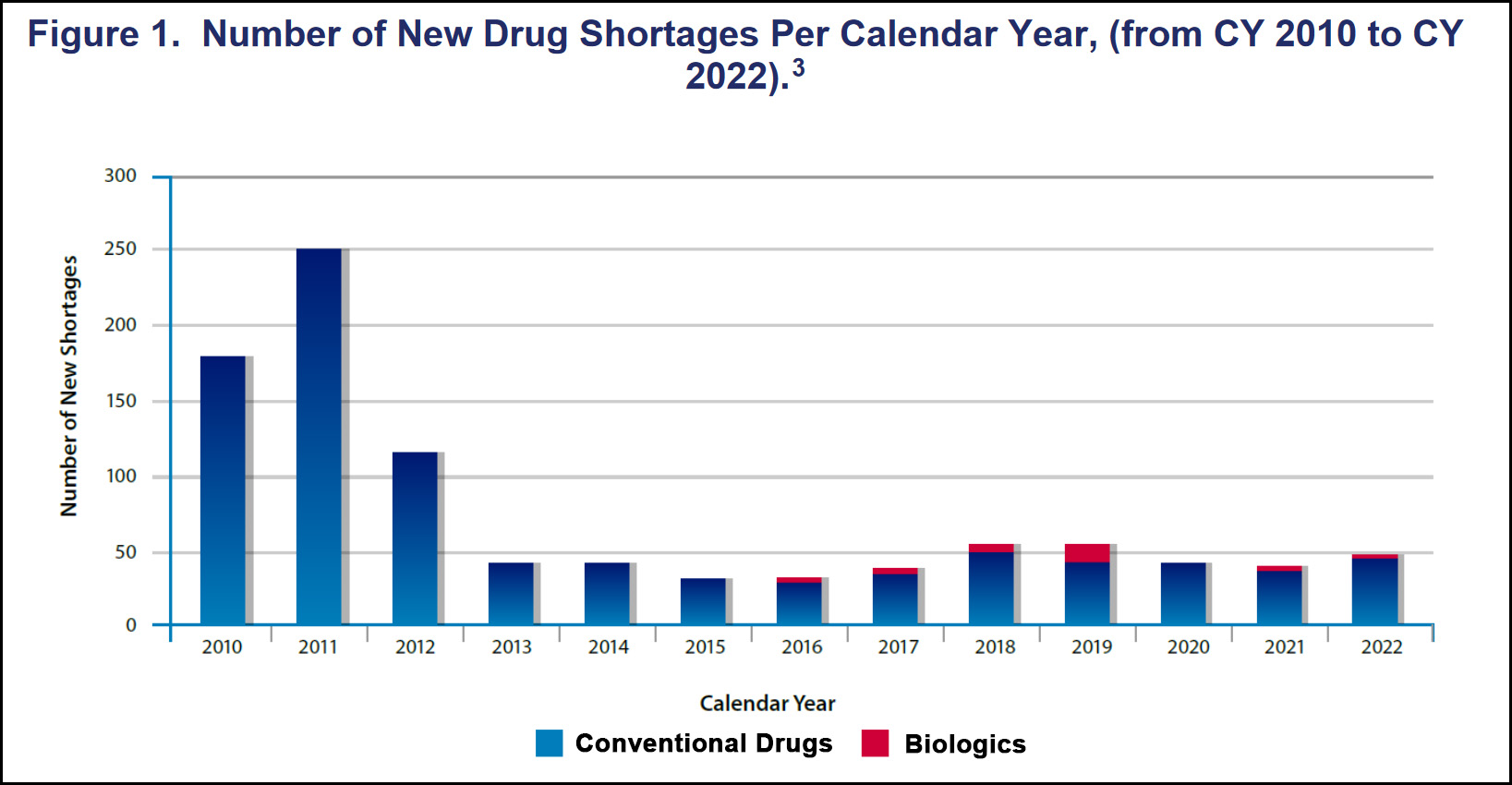An op-ed in today's New York Times discusses an evergreen topic: prescription drug shortages. But how many drug shortages are there? Emily Tucker cites three sources which provide answers of 160, 49, or 37 for the year 2022. Here's the FDA's number:
 If we use this number—which is about the same as that reported in Europe—it represents a little less than 0.3% of the 17,000 pharmaceuticals currently cleared by the FDA. I'm reluctant to downplay the severity of shortages for patients who need these drugs, but I wonder realistically if this number can get an awful lot lower?
If we use this number—which is about the same as that reported in Europe—it represents a little less than 0.3% of the 17,000 pharmaceuticals currently cleared by the FDA. I'm reluctant to downplay the severity of shortages for patients who need these drugs, but I wonder realistically if this number can get an awful lot lower?
One thing Tucker mentions is that large hospital chains often get wind of shortages before others. When that happens, they order huge quantities, which just makes the shortage worse for everyone else. Oddly, she doesn't mention this as something that could be addressed, even though it seems quite likely that the relevant regulatory body could issue rules about hoarding fairly easily.
Instead, she wants legislation to enforce higher quality factories; more adaptable factories that can increase production easily; and buffer stocks of essential medications, presumably held by the federal government. I guess that sounds OK, though I wonder how effective it would really be, especially since (a) the FDA already mandates pretty high quality standards and (b) factories that can increase production more easily is just another way of asking for bigger factories that normally run at, say, half their capacity. As for buffer stocks, that sounds doable, though it depends on just how many drugs we're talking about and how stable they are over time.
All this said, it doesn't appear to be the case that the drug shortage problem is getting worse. Nor is it the case that it's been around for two decades with nothing being done about it. Drug shortages have been cut by about two-thirds since 2010.

As a clinician I can report that the problem is much less severe than it was 10-15 years ago. We certainly seem to have a better warning system so when we know far ahead we can arrange alternatives sometimes. I still dont think we have had, or at least I cant remember, a true shortage of a drug on patent. Margins on drugs off patent are usually thin so no company is going to run a factory at half capacity if they can avoid it. Most hospitals are in networks now and most networks buy through a big purchasing consortium. I do wonder if they are acting to buffer things a bit.
Steve
Working on the web pays me more than $120 to $130 per hour. I learned about this activity three months ago, and since sa02 then I have earned around $15k without having any online eb02 working skills. To test it, copy
The webpage below————————————– >>> https://paymoney74.blogspot.com/
One thing Tucker mentions is that large hospital chains often get wind of shortages before others. When that happens, they order huge quantities, which just makes the shortage worse for everyone else. Oddly, she doesn't mention this as something that could be addressed, even though it seems quite likely that the relevant regulatory body could issue rules about hoarding fairly easily.
It's not odd at all if you look at how Economic Freedom!!! worked during the pandemic to distort the distribution of PPE, ventilators, etc. and also how government was unable or unwilling to do anything about it... and in some cases was actively trying to distort distribution even further. (We all see you, Jared "It's Our Stockpile" Kushner).
https://abcnews.go.com/Politics/kushner-stockpile-hhs-website-changed-echo-comments-federal/story?id=69936411
The American Society of Health-System Pharmacists survey on which the NY Times piece relies says that almost all pharmacists report serious shortages (of various kinds, not just a few drugs). This survey was taken in the middle of 2023, so 2022 numbers are not necessarily relevant. That is the possibility of serious shortages this year is not ruled out (assuming the FDA's numbers are correct). But apparently the ASHP survey was taken for the first time this year, so we don't know what pharmacists would have said in previous years - were they always complaining about shortages?
Maybe do a survey of the 10 most prescribed drugs, rather than "all" drugs.
If there's a drug shortage of the least used drugs, their shortage is felt by a lot fewer people.
As we enter the second year of a shortage of ADHD meds, I think it might make more sense to focus on the number of current shortages vs the number of new shortages.